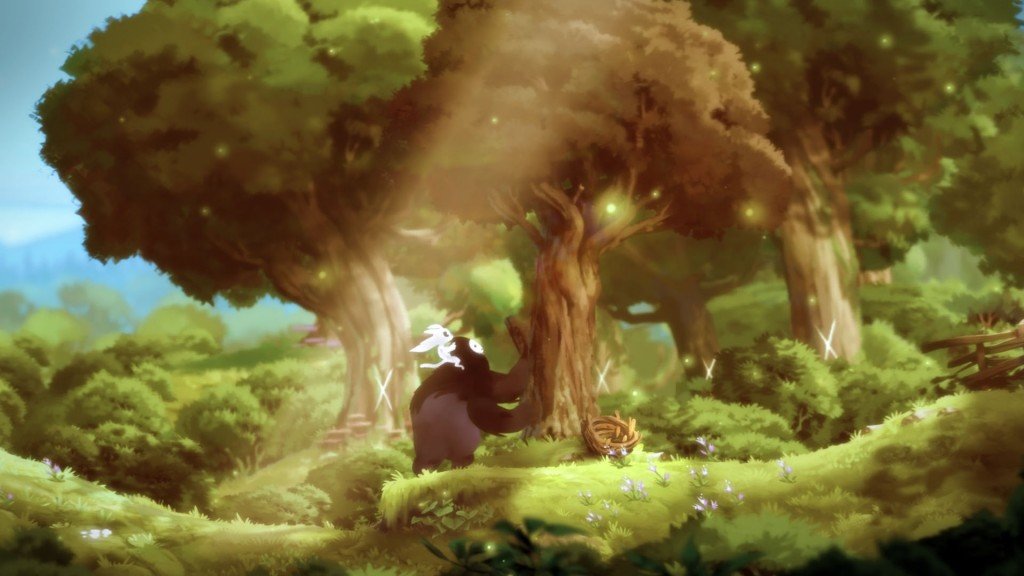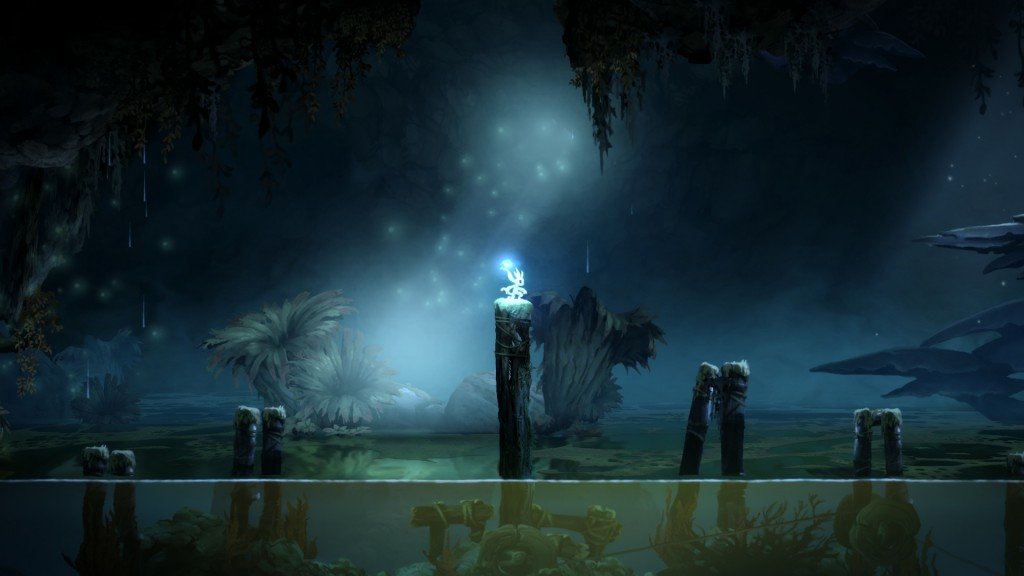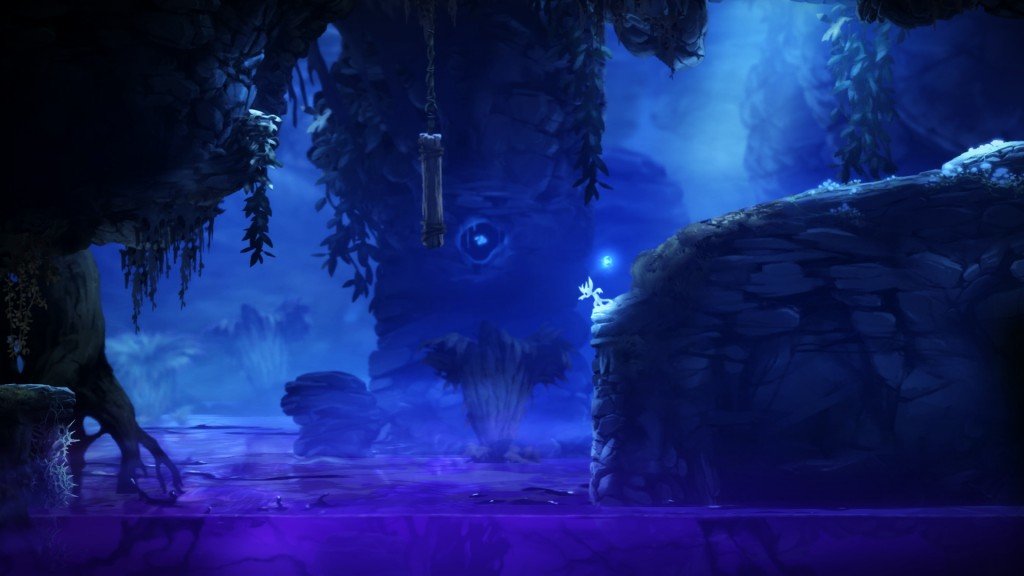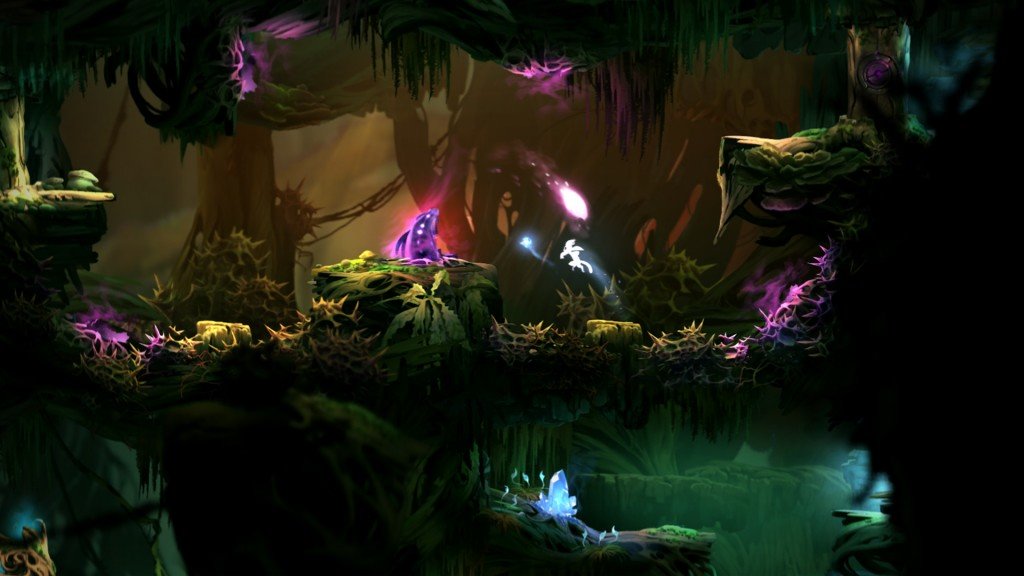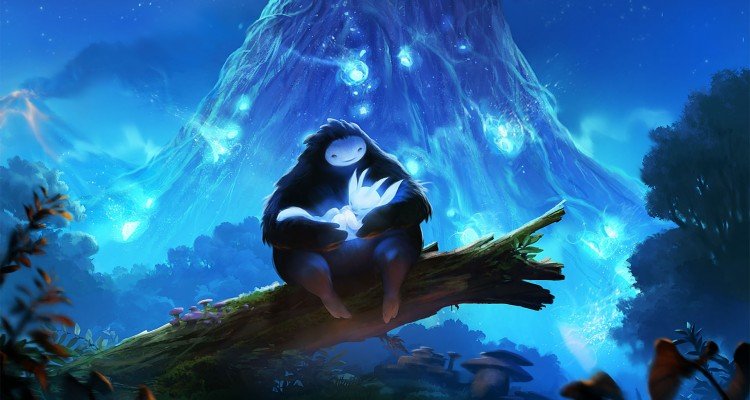I won’t tell you I cried after the opening of Ori and the Blind forest, but I certainly had some stirring of emotions swelling inside me as I watched the story begin. It does well to punch you in the gut, rip your heart out, make you feel all sorts of pain, and then stitch you back up to start the real game. Even without the opening, I can safely say Ori and the Blind Forest is one of the most memorable games I’ve played in the past couple years.
You play as a little spirit creature named Ori. After some disastrous event that destroys the forest and takes the life of someone very close to Ori, he sets out on his own. He meets a spirit named Sein, who tells Ori that the forest is in danger and needs saving. Together, they embark on their journey to restore the forest to the peaceful place it once was. The story is simple in the grand scheme of things, but despite that it still carries some weight in its meaningful characters you are bound to love. There are barely any words in the game, but that didn’t stop me from loving and cherishing every character I met along the way.
The true beauty comes with the setting of the forest that the story unfolds in. It’s magical world that is beautifully rendered in all its 2D glory. It reminded me of Trine’s fantasy world with all the colorful and robust visuals plus the amazing lighting effects and deeply intricate background images. Think Rayman with the hand-drawn style, but up everything graphically. You really can get lost in the 2D world, and throughout the entire game I never once grew tired of what I was seeing. Everything was done with such detail you can’t help but appreciate the time it took to craft this game.
Add in the memorizing soundtrack and you’ll be entrapped in Ori and the Blind Forest with no chance of escaping. The music carries you through the levels, and sets the mood perfectly at all stages of the game, but it is the dramatic events that make the soundtrack come to life to give you a surge of strength that will stay with you after you see the credits roll. It could be a simple melody, or a full orchestra, the music does its job well in making you become immersed in the world.
The story, setting, and music balance each other expertly to present the craftsmanship of the game as top class, but that wouldn’t make Ori and the Blind Forest one-of-a-kind without its spectacular gameplay. As with most platformers, you will spend the majority of your time jumping between objects, but is the creatively designed levels that requires some imaginative critical thinking which sets it apart from other platformers.
Ori and the Blind Forest is in the style of Castlevania and Metriod in a genre that has cleverly been called Metroidvania – meaning, it’s all one big map. You gain experience to spend on new abilities as well as unlocking new skills through the progression of the story. When you learn new skills you can open up new areas on the map, but the entire map is all connected with no loading times, so you can run from one end to the other without stopping. I made mental notes of places I couldn’t reach or walls I couldn’t break, so when I learned new abilities, I could return to these locations and uncover the secrets that were hidden.
The levels are well designed for the most part. Some you will instantly know what to do and breeze through sections of the level very quickly. Others will make you hesitate and think before you figure out the proper path. There are plenty where you know the path but navigating it can be tricky. Then, there are some that are so utterly frustrating you will curse at the screen and rage-quit. In fact, most of my playing sessions ended with me slamming my laptop closed out of anger vowing to complete the section another day.
I don’t want to understate this. Ori and the Blind Forest is a fun, childlike game that can have some crushingly difficult levels. I like challenging games, and many of the challenges I faced made me feel accomplished after beating them. However, I am not exaggerating when I make the claim that this is the game I’ve rage-quit the most in for years.
Let me be even clearer, there is nothing wrong with a challenging room if it relies entirely on your skill. Some sections of the levels weren’t exactly the most fun, particularly one that reminded me of Flappy Bird, but that is all based on my own skill, so I can’t only get mad at myself. The issue I take with the drastic difficulty curve has to do with how Ori can sometimes interact with the environment in such a way it can lead to some cheap deaths. Everything has a flow, and that’s part of the visual appeal. Ori likes to backflip off walls and do 360 spins. They look cool in some moments and it adds that extra charm to give Ori even more uniqueness. Sometimes you need very precise movements and I found Ori’s extra flare gets in the way.
That does not mean the controls are cumbersome, they are perfectly responsive a majority of the time, but on the occasion, you might overshoot a platform because Ori wanted to do an ariel flip and he couldn’t cut it short. Perhaps you wanted to jump more vertically and Ori did a backflip instead, which caused the jump to be more horizontal. It’s no big deal, the ingenious checkpoint system will account for that.
You set your own checkpoints but there is not an unlimited amount. You collect special crystals to fill orbs, and by sacrificing an orb you can make a checkpoint. The same orbs are always used for some powerful attacks, and you can only hold a certain number at a time. You can increase the number as you play thankfully, but this is a classic risk/reward system.
After realizing how tough some of the levels were, I became pretty generous with the check points. Being able to set a checkpoint right before a tough area saves a lot of time when you’re dying a lot. Finding crystals to energize the orbs is easy enough, but sometimes you will run out. This happened to me a few times as I progressed through the level with barely any health and a save point that was far behind me. Dying would send me back through some tough hazards that I had no intention of dealing with again. I can easily see using a save point carelessly could result in you getting stuck in an area, but I never had that issue.
The small complaints and noteworthy challenge aside, the gameplay is a lot of fun. Navigating the levels and problem-solving through some ingenious puzzles makes for a great experience. You need to use your abilities in new ways to complete some areas, and I always felt proud I thought of using a skill in a way the game didn’t blatantly tell me. I moved through the levels really slowly at first, but as time went on I was able to quicken my pace. Soon i was flipping, wall-jumping, and dodging my way through the forest. It takes some thinking, and a lot of skill, but Ori and the Blind Forest is a lot of fun to play.
My biggest issue were all the enemies. They did their job of course—pestering the hell of you as you’re trying to jump between platforms, but don’t bother taking the time to eliminate all the enemies before advancing. They respawn far too quickly. This is necessary in some cases because you need them to help cross a gap, but many times they are just an annoyance. I understand that’s the point of them, but if you take the time to kill them so you can focus on making a difficult jump they shouldn’t spawn to annoy you some more. The combat isn’t spectacular either, about 90% of the time you mash one button and you only have to be remotely near them to land the hits. This makes fighting the enemies in a room more of a chore than entertainment.
After beating a level there is a dramatic chase that puts Ori one wrong step away from death. The rousing music, intensity of the event, and the precision controls make these chases easily the most memorable moments in the entire game. That’s equally parts good and bad. They can be absolutely infuriating, and in my case, they were more trail and error than skilled-reaction. It was only after dying enough times for me to memorize the chase and perform it blindfolded that I was ever able to get to the end. Still, once I reached the end, I could sit back and let out a breath feeling satisfied that I finally overcame the challenge. I can appreciate them for what they accomplish with making my blood pump, but on my 18th run I don’t really care anymore, no matter how uplifting the music may be.
Ori and the Blind Forest is a magical game that will entrap you almost immediately with its strong opening. The visuals are breathtaking and the equally intricate music will bring the forest to life. The levels are so challenging they will make you test your best platforming skills, but that’s part of the fun. You’ll feel accomplished if you surpass the obstacles, but you are also just as likely to give up and do something else with your time. I may have become infuriated with Ori and the Blind Forest many, many times, but it still was a fun experience that made me feel good for having beat it. This is a modern take on classic platformers that may press us to the limits, where we shout obscenities claiming that death wasn’t fair, but they are always worth it in the end.
This review is based on a retail copy of the PC version of Ori and the Blind Forest developed by Moon Studios and distributed by Microsoft Studios.
- Great Atmosphere
- Challenging Gameplay
- Progression of Skills
- Difficulty Spikes
- Lots of Trail and Error
- Some Unfair Deaths

